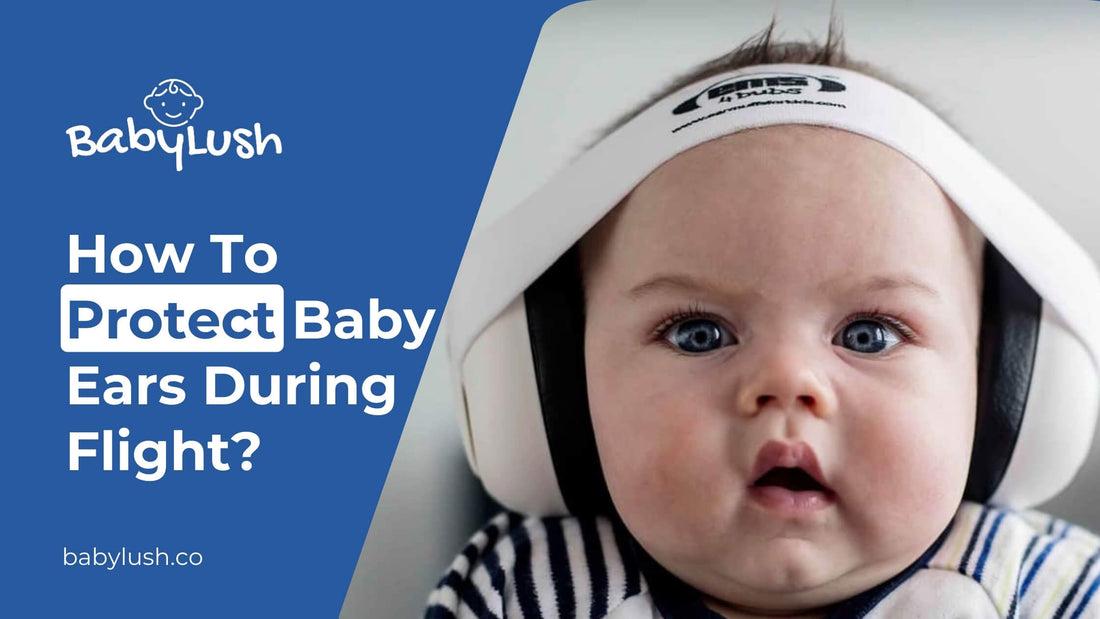
How To Protect Baby Ears During Flight?
Share
There are many challenges to bringing a young child on a plane, one of which is protecting their sensitive ears during takeoff and landing. Babies find it rough during this time because changes in air pressure can hurt or make them uncomfortable.
With little preparation and helpful strategies, like using baby ear muffs for flying you can soothe your little one's ears and make the flight more enjoyable. Due to this, we have put up all-inclusive instructions in this guide.
Why Do Babies Experience Ear Pain During Flights?
The air pressure is lower at lower altitudes and higher at higher ones. When air pressure isn't balanced, it presses on the eardrum and makes it hurt. That's why it's common for babies to cry in the final minutes of a flight—the cabin air pressure rises as the plane gets ready to land.
Babies may scream in pain during flights due to this rapid changes in air pressure that occur during takeoff and landing. Because their Eustachian tubes are smaller and less efficient, the pressure in their ears is not evenly distributed. Because of this, there may be an uneven distribution of pressure, which can lead to unpleasant sensations.
Can Flying Damage A Baby's Ears?
When babies experience ear pain or discomfort when flying, it will be temporary. When traveling by air, the sudden shift in pressure can amplify or prolong the symptoms of a cold or ear infection in young children and babies. If your child has an ear infection or is in discomfort, it is usually advised to use baby ear muffs for flying or postpone flying travel. Please consult your physician if you feel the need to do so.
Symptoms Of Mild Air Pain In Babies
When the cabin pressure fluctuates while flying, it can cause ear pain in babies. Babies may show a variety of symptoms. Listed below are a few typical warning signals:
- Persistent crying or fussiness
- Pulling or Tugging at Ears instinctively
- Increased irritability and restlessness
- Difficulty Feeding
- Trouble Sleeping
- Difficulty falling or staying asleep
- A sudden change in the pitch or intensity of crying
- Abnormal head shaking
If you are a parent, knowing to look out for these signs can help you ease your baby's pain and make the flight more tolerable for everyone.
How To Avoid Ear Pain During Flight For Toddlers?
Following are some of the tips that you can use in order to avoid ear pain during flight for toddlers.
1. Nursing or Bottle-Feeding
To bring the pressure in the Eustachian tubes to a normal level, it is helpful to swallow and sucking. You can ease their pain by breastfeeding, bottle-feeding, or providing a pacifier at these times.
2. Use A Pacifier
During takeoff and landing, your infant can suck on their pacifier if they use one. Some babies find that relieving sucking helps alleviate ear pressure.
3. Keep Baby Awake
Keep the baby as awake as you can during takeoff and landing. If they have trouble controlling their ear pressure while sleeping, try feeding him so that he experiences swallowing while awake.
4. Yawning and Chewing
Give older babies who are ready to consume solids a little snack or teething cracker to gnaw on. Chewing will reduce the ear pressure.
5. Use Baby's Ear Muffs For Flying
Babies' ears can adapt to changes in pressure with the help of specialized baby earmuffs for flying. Another option to lessen the effect of loud noises on a flight is to use headphones with noise cancellation.
6. Make Sure You Hydrate Your Infant
Be sure to keep your infant hydrated by providing drinks frequently during the trip. As a result, you may experience less discomfort and ear pain generally.
7. Relieve Ear Pressure
Rub your infant's ears and the space immediately surrounding them with a light massage. Some of the pain and pressure may subside by massaging.
Should Babies Wear Ear Muffs On Planes?
There are a lot of sounds to deal with when flying, from the plane's engine to takeoff to the noise of other passengers talking. If you're concerned about the plane's loud noises, you can simply bring along earmuffs that are suitable for babies.
If you and your baby are planning on taking a longer journey, baby ear muffs can help prevent noise and protect your hearing. Be careful to bring earmuffs in your carry-on or Pack as they can help reduce pain caused by fluctuations in air pressure.
You may also like this:
How To Warm A Baby Bottle?
Conclusion
You shouldn't let the thought of flying with a baby put you off. You may make sure that you and your kid have a more comfortable travel by being proactive and protecting their ears. Never forget that being prepared in advance is important. With the right planning via muffy baby ear protection, you can ease your child's anxiety about flying and make air travel a fun experience for everyone.
Wishing you a safe and enjoyable flight!